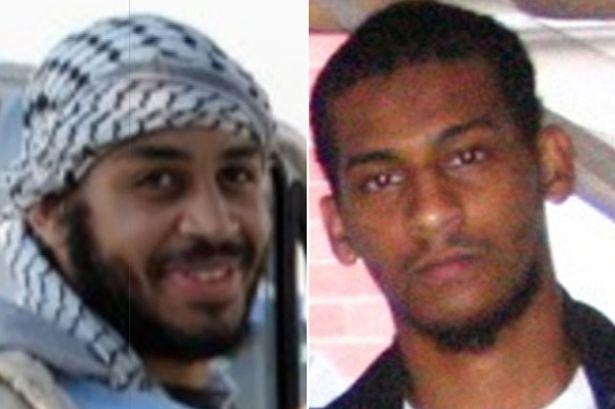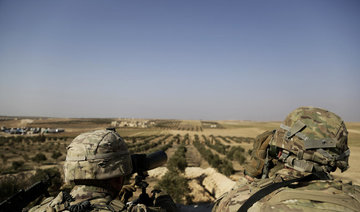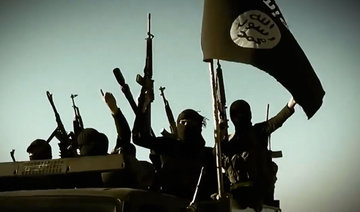LONDON: The mother of a man murdered by the British-born Daesh extremists and a French hostage who survived captivity with their cell said the two fighters captured in Syria should spend the rest of their lives in prison.
Diane Foley, whose son James was kidnapped and eventually executed, welcomed the capture of Alexander Kotey and El-Shafee ElSheikh, two of the so-called “Beatles” cell, captured by the US-backed Syrian Democratic Forces in Syria, and said she wanted them to be put on trial and jailed for life.
“Their crimes are beyond imagination. They really have not done anything good in the world so I think they need to spend the rest of their life being held,” she said.
French journalist Nicolas Henin was held with other hostages, including fellow journalist James Foley, in an underground cell. One of his captors was Mohammed Emwazi, the Kuwaiti-born Briton nicknamed Jihadi John, who was notorious for his brutality.
Henin spent ten months in captivity — six of them in a cell underground in Syria and chained for long periods to three other French hostages.
He said there were also French extremists among their captors and firmly believes that all captured Daesh insurgents should be tried in their home country, including the two “Beatles.” Handing them over to the Americans to be sent to Guantanamo Bay would only breed more violence and turn them into martyrs, he added.
“The worst thing we can do with the terrorist is to deprive him of his rights, because then you make a terrorist become a victim, and if you victimize someone then you just fuel his narrative and you just confirm his narrative. So everybody has a right for a fair trial and for justice,” Henin said.
He and three compatriots were released in April 2014 after lengthy negotiations with the French government, although Francois Hollande, who was president of France at the time, insisted no ransom had been paid.
Senior SDF official Redur Xelil told Reuters on Friday that Kotey had been aiming to reach Turkey when he was captured by in a rural area of Raqqa province on Jan. 24.
“He was intending to escape toward Turkey with cooperation and coordination with friends of his on the Turkish side,” Xelil said. “He is now under investigation with us,” he said.
A senior security official in Turkey, however, said it was “nonsense” that Daesh militant would try to reach Turkey.
The group of four British Daesh militants were nicknamed the Beatles because of their British accents.
They are known to have captured at least 23 foreign hostages, nearly all of whom were ransomed or killed. The gang were known to torture their prisoners with tasers, water boarding and mock executions.
Some of their victims, including British aid workers David Haines and Alan Henning, were executed on camera.
Emwazi was killed in an airstrike in 2015 in Syria. Another member of the British cell, Aine Davis, is serving seven-and-a-half years in a Turkish prison after being convicted of terrorism charges.
The British defense secretary Gavin Williamson welcomed news that the two members of the British cell who remained at large had been captured.
“These are people who have done absolutely vile & despicable crimes and brought absolutely so much misery. It is good that they have been hunted down and caught,” he said.
Defense minister Tobias Ellwood, whose brother Jonathan was killed in a terrorist attack in Bali in 2002, said that while the rules of engagement on the battlefields of Iraq and Syria authorized the killing of terrorists, the two Britons should “answer and be judged to a legitimate authority” and called for a special court to be set up for the trials of Daesh militants.
“The horror of 9/11 meant we briefly lost sight of the standards and rule of law that took centuries to develop and fundamentally distinguish us from the terrorist. Guantanamo Bay created a new combatant status that bypassed the Geneva Convention, used torture and failed to address a wider global jihadist insurgency that continues today,” he said.
“Given the scale of foreign fighters attracted to Daesh, we should consider an agreed international process involving [the International Criminal Court at] the Hague which ensures terrorists from any origin are transparently and fairly held to account for their actions.”
Families of Daesh ‘Beatles cell’ welcome their capture
Families of Daesh ‘Beatles cell’ welcome their capture

Man accused of attacking TV reporter, saying ‘This is Trump’s America now’

- Alex, who had been out reporting, then drove back to his news station in the city
DENVER: A Colorado man is facing possible bias-motivated charges for allegedly attacking a television news reporter after demanding to know whether he was a citizen, saying “This is Trump’s America now,” according to court documents.
Patrick Thomas Egan, 39, was arrested Dec. 18 in Grand Junction, Colorado, after police say he followed KKCO/KJCT reporter Ja’Ronn Alex’s vehicle for around 40 miles (64 kilometers) from the Delta area. Alex told police that he believed he had been followed and attacked because he is Pacific Islander.
After arriving in Grand Junction, Egan, who was driving a taxi, pulled up next to Alex at a stoplight and, according to an arrest affidavit, said something to the effect of: “Are you even a US citizen? This is Trump’s America now! I’m a Marine and I took an oath to protect this country from people like you!”
Alex, who had been out reporting, then drove back to his news station in the city. After he got out of his vehicle, Egan chased Alex as he ran toward the station’s door and demanded to see his identification, according to the document laying out police’s evidence in the case. Egan then tackled Alex, put him in a headlock and “began to strangle him,” the affidavit said. Coworkers who ran out to help and witnesses told police that Alex appeared to be losing his ability to breathe during the attack, which was partially captured on surveillance video, according to the document.
According to the station’s website, Alex is a native of Detroit. KKCO/KJCT reported that he was driving a news vehicle at the time.
Egan was arrested on suspicion of bias-motivated crimes, second degree assault and harassment. He is scheduled to appear in court Thursday to learn whether prosecutors have filed formal charges against him.
Egan’s lawyer, Ruth Swift, was out of the office Friday and did not return a telephone message seeking comment.
KKCO/KJCT vice president and general manager Stacey Stewart said the station could not comment beyond what it has reported on the attack.
UN approves new AU force to take on Al-Shabab in Somalia

UN: The UN Security Council on Friday gave the green light to a new African Union force in Somalia that is meant to take on the Islamist armed group Al-Shabab, with the soldiers due to deploy in January.
The resolution was adopted by 14 of the Council’s 15 member states, while the United States abstained due to reservations about funding.
It provides for the replacement of the African Union Transition Mission in Somalia (ATMIS), whose mandate ends on December 31, by the African Union Support and Stabilization Mission in Somalia (AUSSOM).
Somalia is one of the world’s poorest countries, enduring decades of civil war, a bloody insurgency by the Al-Qaeda-linked Al-Shabab, and frequent climate disasters.
Representatives from Somalia and its western neighbor Ethiopia were invited to participate in the council’s meeting, although they were not allowed to vote.
“We emphasize that the current AUSSOM troops allocations are completed through bilateral agreements,” said the Somali representative, adding 11,000 troops were currently pledged.
On Monday, Egypt’s foreign minister announced his country would take part in the new force.
Tensions flared in the Horn of Africa after Ethiopia signed a maritime deal in January with the breakaway region of Somaliland, pushing Mogadishu closer to Addis Ababa’s regional rival Cairo.
This month, Turkiye brokered a deal to end the nearly year-long bitter dispute between Somalia and Ethiopia, although Ethiopian troops would not be involved in the new AU force.
Burundi will not be taking part in the new force either, a Burundian military source told AFP on condition of anonymity.
The text adopted by the UN Security Council provides for the possibility of using a mechanism that it created last year, under which an African force deployed with the green light of the UN can be up to 75 percent financed by the UN.
“In our view, the conditions have not been met for immediate transition to application of” that measure, US representative Dorothy Shea said, justifying her country’s abstention.
Trump asks Supreme Court to delay TikTok ban so he can weigh in after he takes office

- The brief from Trump said he opposes banning TikTok at this junction
President-elect Donald Trump asked the Supreme Court on Friday to pause the potential TikTok ban from going into effect until his administration can pursue a “political resolution” to the issue.
The request came as TikTok and the Biden administration filed opposing briefs to the court, in which the company argued the court should strike down a law that could ban the platform by Jan. 19 while the government emphasized its position that the statute is needed to eliminate a national security risk.
“President Trump takes no position on the underlying merits of this dispute. Instead, he respectfully requests that the Court consider staying the Act’s deadline for divestment of January 19, 2025, while it considers the merits of this case,” said Trump’s amicus brief, which supported neither party in the case.
The filings come ahead of oral arguments scheduled for Jan. 10 on whether the law, which requires TikTok to divest from its China-based parent company or face a ban, unlawfully restricts speech in violation of the First Amendment.
Earlier this month, a panel of three federal judges on the US Court of Appeals for the District of Columbia Circuit unanimously upheld the statute, leading TikTok to appeal the case to the Supreme Court.
The brief from Trump said he opposes banning TikTok at this junction and “seeks the ability to resolve the issues at hand through political means once he takes office.”
Senegal PM seeks to repeal contested amnesty law

- Sonko’s government pledged earlier this month to investigate dozens of deaths resulting from the political violence between 2021 and 2024
DAKAR: Senegalese Prime Minister Ousmane Sonko said Friday that his government would submit legislation to repeal a law by former president Macky Sall granting amnesty for deadly political violence.
The controversial amnesty was granted just before March 2024 elections as Sall sought to calm protests sparked by his last-minute postponement of the vote in the traditionally stable West African country.
Critics say the move was to shield perpetrators of serious crimes, including homicides, committed during three years of political tensions between February 2021 and February 2024.
But it also allowed Sonko, a popular opposition figure, to stand in the elections after court convictions had made him ineligible, as well as Bassirou Diomaye Faye, who eventually won the presidency.
Sonko’s government pledged earlier this month to investigate dozens of deaths resulting from the political violence between 2021 and 2024.
“In addition to putting compensation for victims into the budget, a draft law will be submitted to your august Assembly to repeal the March 6, 2024 amnesty so that light may be shed and responsibilities determined on whatever side they may lie,” Sonko said in a highly awaited policy speech to lawmakers.
“It’s not a witch hunt and even less vengeance ... It’s justice, the foundation without which social peace cannot be built,” Sonko said.
Sonko’s speech also laid out plans for the next five years to pull Senegal out of three years of economic and political turmoil that have sent unemployment soaring.
He and Faye, who won the presidency and in November secured a landslide victory in parliament, now have a clear path for implementing an ambitious, leftist reform agenda.
“We must carry out a deep and unprecedented break never seen in the history of our country since independence” from France, Sonko told lawmakers.
He said Senegal remained “locked into the colonial economic model” and vowed an overhaul of public action and tax reforms to foster “home-grown growth.”
ECOWAS defends Nigeria against Niger’s claims of ‘destabilization’ plot

- Niger’s military leaders broke away from the ECOWAS amid rising anti-France sentiments
LAGOS: West Africa’s regional bloc ECOWAS has come to Nigeria’s defense after claims by Niger that it was plotting to destabilize its neighbor.
Niger’s military leader General Abdourahamane Tchiani accused Nigeria of providing homes for two French nationals it expelled, allegedly for anti-government activities, during a televised Christmas Day broadcast on Wednesday.
Tchiani also lashed out against ECOWAS and claimed that France had established a base in Nigeria where it was arming terror groups in the Lake Chad region to foment unrest in his country.
“Nigerian authorities are not unaware of this underhanded move,” Tchiani said. “It is near a forest close to Sokoto where they wanted to establish a terrorist stronghold known as Lakurawa.”
“The French and ISWAP made this deal on March 4, 2024,” he added, referring to the Daesh West Africa Province militant group.
Earlier in December, Niger’s foreign minister summoned the charge d’affaires at the Nigerian Embassy, accusing its neighbors of “serving as a rear base” to “destabilize” the country.
ECOWAS and Nigeria rejected the accusations. “For years, Nigeria has supported peace and security of several countries not only in the West African subregion but also on the African continent,” the regional bloc said in a statement released.
“ECOWAS therefore refutes any suggestion that such a generous and magnanimous country would become a state-sponsor of terrorism.”
Nigeria’s Information Minister Mohammed Idris said in a separate statement Thursday that his country had no alliance with “France or any other country” to destabilize Niger, with whom it has had a choppy relationship since Tchiani seized power in a July 2023 coup.
Niger’s military leaders broke away from the ECOWAS amid rising anti-France sentiments.
Nigeria’s President Bola Ahmed Tinubu, who is currently head of the ECOWAS bloc, had briefly considered a regional military intervention to reinstate Niger’s ousted president Mohamed Bazoum.
But Idris said that Nigeria was open to dialogue with Niger despite its political situation.
“Nigeria remains committed to fostering regional stability and will continue to lead efforts to address terrorism and other transnational challenges,” he said.






















